
This will be a critical moment in the cost-of-living contest between the Albanese government and the Coalition. It will establish more acutely than ever the wildly different economic approaches on offer and who can command the narrative.
For the first time, the billions of dollars in energy rebates rolled out by the federal and at least two state governments will begin to flush through the system.
As a result, economists are forecasting the headline inflation number to drop significantly for the first time in 2½ years.
If this happens, Jim Chalmers will have got his Christmas wish early. He will claim a considerable victory. Yet it will also expose Labor’s tactical approach to the problem. Anthony Albanese and the Treasurer are trying to buy relief from inflation by indirectly funnelling money into people’s pockets.
The Coalition accuses Chalmers of applying a band-aid to a bullet wound, of treating the symptoms rather than the cause of the problem with hand-outs to targeted groups to alleviate their exposure to rising prices.
Now opposition Treasury spokesman Angus Taylor has for the first time put meat on the bones of what the Coalition approach will be. Conscious of the austerity tag that killed the Coalition’s 2014 budget, Taylor is going after Labor’s off-budget government spending programs.
While Chalmers will argue that the bulk of the spending is beyond the inflation danger period, it is still vulnerable to a broader argument that Labor’s agenda is now a key driver of homegrown inflation – an accusation the RBA has made implicitly and explicitly of state and federal government stimulation of public demand.

With $100bn in savings already, and more to come, Taylor will argue that this doesn’t touch the sides of the $315bn Labor has committed to in its first two years of office.
This is not a number Chalmers disputes, considering his accusation that this is in fact the number the Coalition intends to cut. If only, Taylor would presumably lament.
But it will be the interpretation of Wednesday’s inflation data, and whose version is most convincing, that could turn the politics either way.
And it will come down to the emphasis on two different sets of numbers – headline inflation and underlying inflation, or trimmed mean inflation.
It is the latter RBA governor Michele Bullock has publicly stressed will be what the central bank focuses on when considering monetary policy. It is the former that Chalmers is banking on to deliver his Pyrrhic victory.
The divergence between these two numbers will also be telling.
While energy rebates may work as a political exercise, few believe it is good economics. Once rebates comes off, inflation is likely to rage again. With international gas prices through the roof, this is almost guaranteed.
Labor is betting that this doesn’t happen until after the election. So it will be mission accomplished for the short term, at least, in Chalmers’ view.
This is a fight the Coalition is begging to have and one it still believes it can win. For this to be successful, though, enough voters need to be convinced Labor’s approach has made their situation worse, for longer.




The political debate over inflation and who is now to blame is poised to explode on Wednesday when the monthly CPI data comes out.